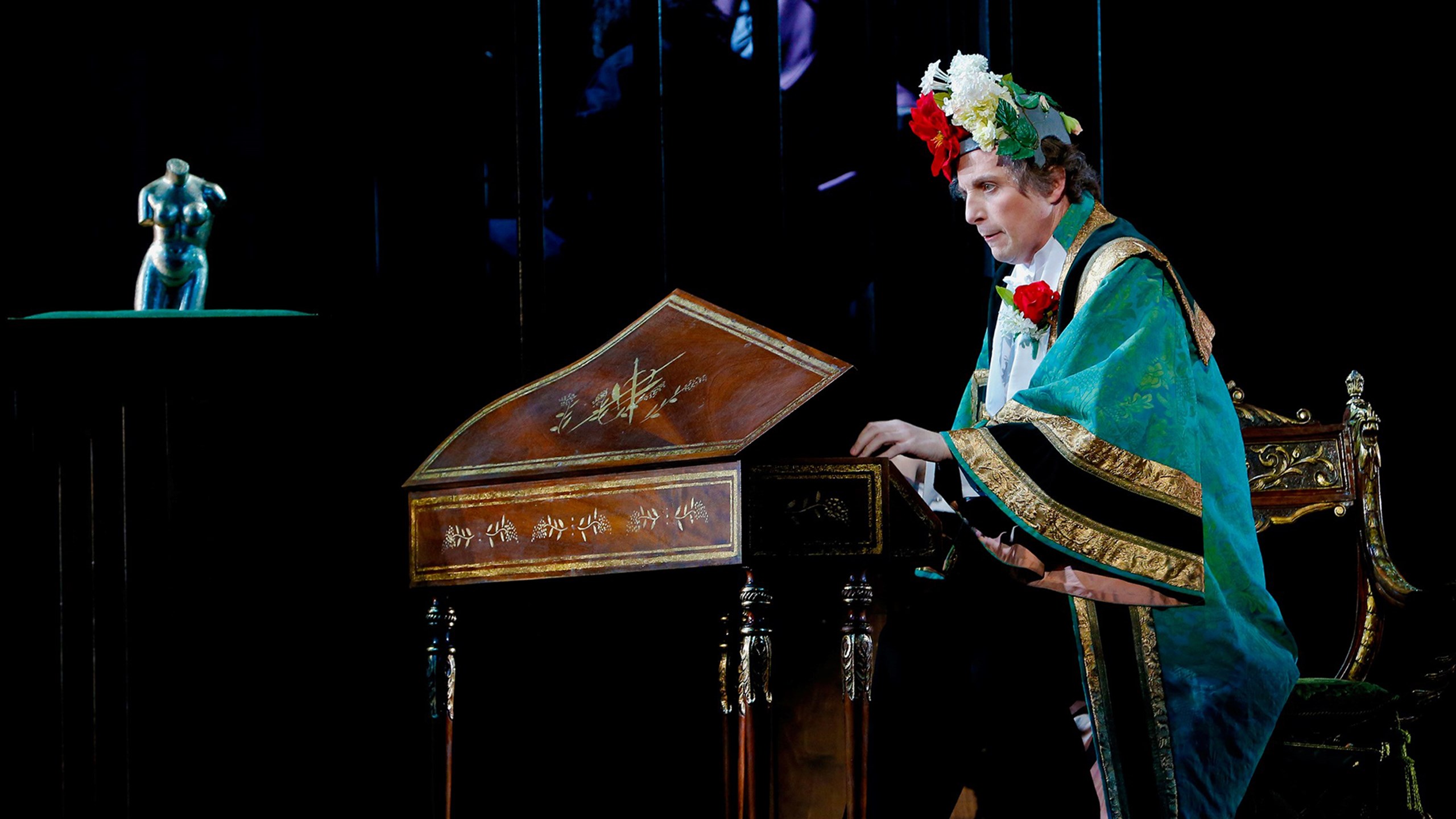WAO Spotlight with Warwick Fyfe
Our final days in the studio are at hand as we prepare to take Rossini’s charming comedy The Barber of Seville to the stage next week. From vocal preparation to characterisation, we want to shine a spotlight on our creatives working tirelessly to bring the magic of opera to you. Connect with your state opera company on an intimate level and journey through the stages of experimentation, reflection and refinement that are integral to a successful production.
This week we are joined by Helpmann Award winning baritone Warwick Fyfe to discuss developing a three-dimensional Doctor Bartolo, old theatre truisms, and the modernity of Lindy Hume’s nuanced production.
1. Now rehearsals for The Barber of Seville are in full swing, what are you finding most challenging and rewarding about the process?
Most challenging is trying not to hobble too much. I developed a nasty case of plantar fasciitis in my right heel during the Adelaide Festival. The artistic challenge however is to avoid a cartoonish, two-dimensional portrayal (this sort of comedy can easily slide into that mode). Also, with a role I’ve done before many times, it’s hard to suppress over-learnt ways of doing things which were devised for other productions. What I do must be integral to THIS interpretation of the work.
2. Tell us about your character Doctor Bartolo – how are you preparing for the role? What interests you about his personality and choices?
The vocal/musical preparation and the dramatic preparation are only notionally separable. In fact, they are aspects of the same process. With my vocal advisor Christina Henson I’ve been endeavouring to make my singing of this role better than it’s ever been. Striving for unobtainable perfection. Now I’m in a rehearsal room with my colleagues I’m listening carefully to what Jason Barry-Smith (Revival Director) is saying and observing what my singer colleagues are doing with their characters.
In terms of avoiding slipping into old habits with my characterisation, it was very helpful during the first staging rehearsal when we discussed the relationship between Bartolo and Rosina. Certain things are intrinsic to the piece - Rosina is always clever and has power over Bartolo even though he thinks he’s running the show, so to that extent perhaps there’s always a feminist aspect to it. However, within that there’s room for nuance. Specifically, in this production it’s not just a blustering fool being bested by feminine wiles. Rather, Bartolo, consciously or unconsciously, senses or intuits that there are lines he’d better not cross. He feels her power. This is made explicit by having Rosina’s boudoir a no-go zone for him. He DARE not go in. In other productions I’ve just barged into her room. This all provides me with an opportunity to develop a character in the round, rather than just a stock buffoon. Perhaps it’s that there’s a modernity to this production’s approach to the work’s native feminism.
3. Barber is full of comedy and wit. How do you incorporate this into your performance?
There’s an old truism (expressed in a variety of ways) in the theatre: if one does too much (in rehearsal) one can always reel it back in a bit but if one is bashful and never gives enough it’s like getting blood from a stone. Ergo, with my three decades of professional experience vibrating in the background, I go for broke and follow any and every nameless intuition. Then the director and I can refine down from whatever manifests. I’ve often heard theatre people refer to the process as having an element of “play”. Lest ye be as little children... I think this is what they mean. It’s the opposite of a forced, contrived, mechanical approach.
4. Do you have a favourite moment in the story you can tease?
I think Bartolo’s first encounter with Basilio is especially funny in this production. We were getting laughs from the production desk and music staff today so that’s hopeful! It’s not quite like any version I’ve done before. The joy is in the details.
5. What messages, questions or sensations do you hope audiences are left with after the curtain falls?
I hope that audience members leave the theatre with the tingling sensation lingering on their faces from the physical experience of live music. Opera needs to be experienced live and unamplified. It needs to be done well enough and with good enough voices for the impact to be visceral. There can be no compromise. Voice must have primacy in opera. I also hope that people’s sides will ache from having laughed their heads off, but that when they’ve calmed down they’ll find themselves contemplating the intrinsic importance of high art. It is not just an optional extra (if we aspire to be civilised).
6. When was the moment you knew you wanted to pursue opera?
When I was told I had a voice. My determination to give it a go firmed after doing some amateur work in opera and concerts in Canberra. I’d been studying tuba at the Canberra School of Music but I decided that if people were correct in thinking I had an unusually good voice, my chances of having a career in classical music were greater if I took that path because I would have a natural advantage. Moreover, there was a discernible route: chorus, young artist programmes, principal artist work… It just made sense.
7. What other exciting projects do you have on the horizon?
The things which are announced are Amonasro in Aida for Opera Australia in Sydney and Alberich in Der Ring des Nibelungen, also for Opera Australia, in Brisbane. The latter will be especially exciting as it’s a new production of the biggest opera of them all. I have to keep stumm about 2022 for now!
Don’t miss Warwick Fyfe's starring performance as Doctor Bartolo in Rossini’s masterpiece The Barber of Seville – book tickets now!
ABOUT WARWICK FYFE
Warwick Fyfe is a Helpmann Award winning opera singer and Churchill Fellow. He is one of Australia’s most highly respected singers and exponents of the Wagnerian repertoire. Wagnerian roles include: Wotan (Die Walkure); Beckmesser (Die Meistersinger); his signature role as Alberich (Der Ring des Nibelungen); Klingsor (Parsifal); Dutchman (Der Fliegende Hollaender); Fasolt (Rhinegold); Herald (Lohengrin); Wolfram (Tannhauser).
Warwick has worked with Finnish National Opera, English Touring Opera, West Australian Opera, Welsh National Opera, Opera Australia, New Zealand Opera, State Opera of South Australia, Victorian Opera, Victoria State Opera. He has performed in Australia, New Zealand, UK, Finland, Singapore, Hong Kong, Poland, Vietnam, Japan and China.
Concert work includes performances with the Japan Philharmonic, Tianjin Symphony Orchestra, Melbourne Symphony, Sydney Symphony, Adelaide Symphony, Tasmanian Symphony, Queensland Symphony, West Australian Symphony; Auckland Philharmonic, New Zealand Symphony, Warsaw Symphony, Singapore Symphony orchestras, and Orchestra of The Music Makers (Singapore).


